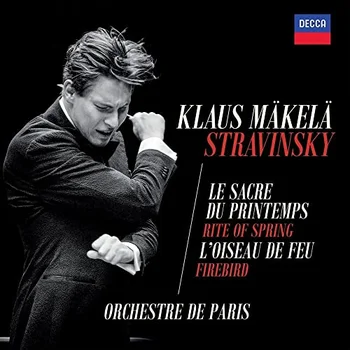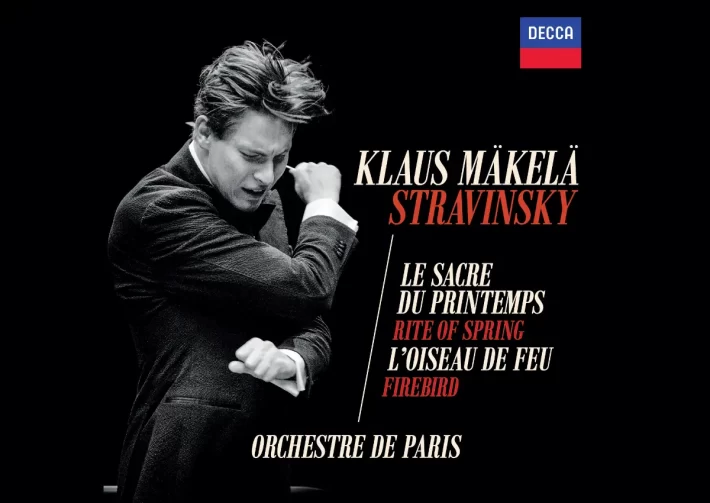Klaus Mäkelä’s March 2022 debut recording of Sibelius symphonies, the beginning of his exclusive contract with Decca, garnered considerable acclaim. That featured the Oslo Philharmonic, where Mäkelä has served as Music Director since 2018. This new album, featuring two of Stravinsky’s most popular ballets, features Mäkelä’s other ‘home’ orchestra, the Orchestre de Paris.

Decca’s recording, made in the relatively new Philharmonie de Paris (opened in January 2015) is exceptionally vivid and clear, though in ‘Le Sacre’ the bass drum is a bit muddy. Anyone hoping for the physical thrill felt in Decca’s earlier recordings with Dorati and Detroit, or Chailly and Cleveland, will be disappointed. Mäkelä’s impressive ear for inner detail is apparent throughout: the voicing and woodwind balance in the opening ‘Introduction’ of Le Sacre is quite magical. But doubts creep in with ‘The Augurs of Spring’ (track 2), where the playing is brilliant, articulate, but far too civilized. Refinement is a consistent issue throughout the performance because it is often so at odds with the ballet’s story.
Mäkelä and his players instill every bar with an undeniable balletic grace, but Vaslav Nijinsky’s original choreography (which we can now watch on YouTube) often rejects that grace for something far more athletic and gnarled. This is a story of pagan worship, human sacrifice, and primitive barbarism. Yet Mäkelä never encourages or allows an ugly sound. Brass is routinely held back at moments when it should dominate the orchestral texture (a few examples: at the end of the second section, or in ‘Ritual of Abduction’ (track 3) where the thematic material goes back and forth, or ‘Spring Rounds’ (track 4), where those savage trombone snarls are far too domesticated. And there are several moments where I craved greater weight and darkness in the sound; again, in ‘Spring Rounds’ the lower strings lack weight and presence when set beside the Berliner Philharmoniker under Rattle (Warner Classics) or the Cleveland Orchestra under Boulez (DG). The bass drum thwacks that drive home the conclusion of Part 1 should all but overwhelm the rest of the orchestra, but here they barely disrupt the carefully calibrated balance.
The same is true in the second section. Softer, slower passages (such as the ‘Introduction’) are beautifully balanced and atmospheric, but when the story (and music) demand a severer, more primal energy, the reading falters. The clarity and precision Mäkelä elicits is impressive and allows one to hear more of the score than does Gergiev’s raucous Kirov performance (Philips/Universal). But Boulez also allows us to hear the score in all its brilliance while conveying the music’s terrifying barbaric nature.
‘The Firebird’ is far more successful, as Mäkelä’s temperament and interpretative approach are perhaps more suited to this gentler fairy tale. I am always happy to hear the full ballet, especially here where the Orchestre de Paris’s sophisticated coloration captures the score in such brilliant technicolor. Again, the ‘Infernal dance’ (track 30) is perhaps a bit reserved, less ferocious when set aside Gergiev’s Kirov reading (again Philips/Universal), or even Rattle’s recent traversal with the London Symphony Orchestra (LSO Live), but the Parisian playing has compelling vibrancy and sensuousness, heightened by the excellence of Decca’s engineering. The horn solo that begins the ‘Lullaby’ (track 31) is breathtakingly beautiful (as are the many wind solos throughout the ballet). The final tableau steadily builds in intensity and richness, and in the final bars brass are finally encouraged to play out, leading to an overwhelming peroration.
Most collectors, of course, already own several recordings of each work. While I do not foresee returning to this ‘Le Sacre’ often, ‘The Firebird’ is a more impressive achievement and can be recommended. Apparently this will be followed by a further Ballet Russes release in 2024 – hopefully that recording will explore some of the lesser-known repertoire written for this esteemed ballet company.
Stravinsky – Le Sacre du printemps & L’oiseau de feu
Orchestre de Paris
Klaus Mäkleä – Conductor
Decca, CD 4853946



















